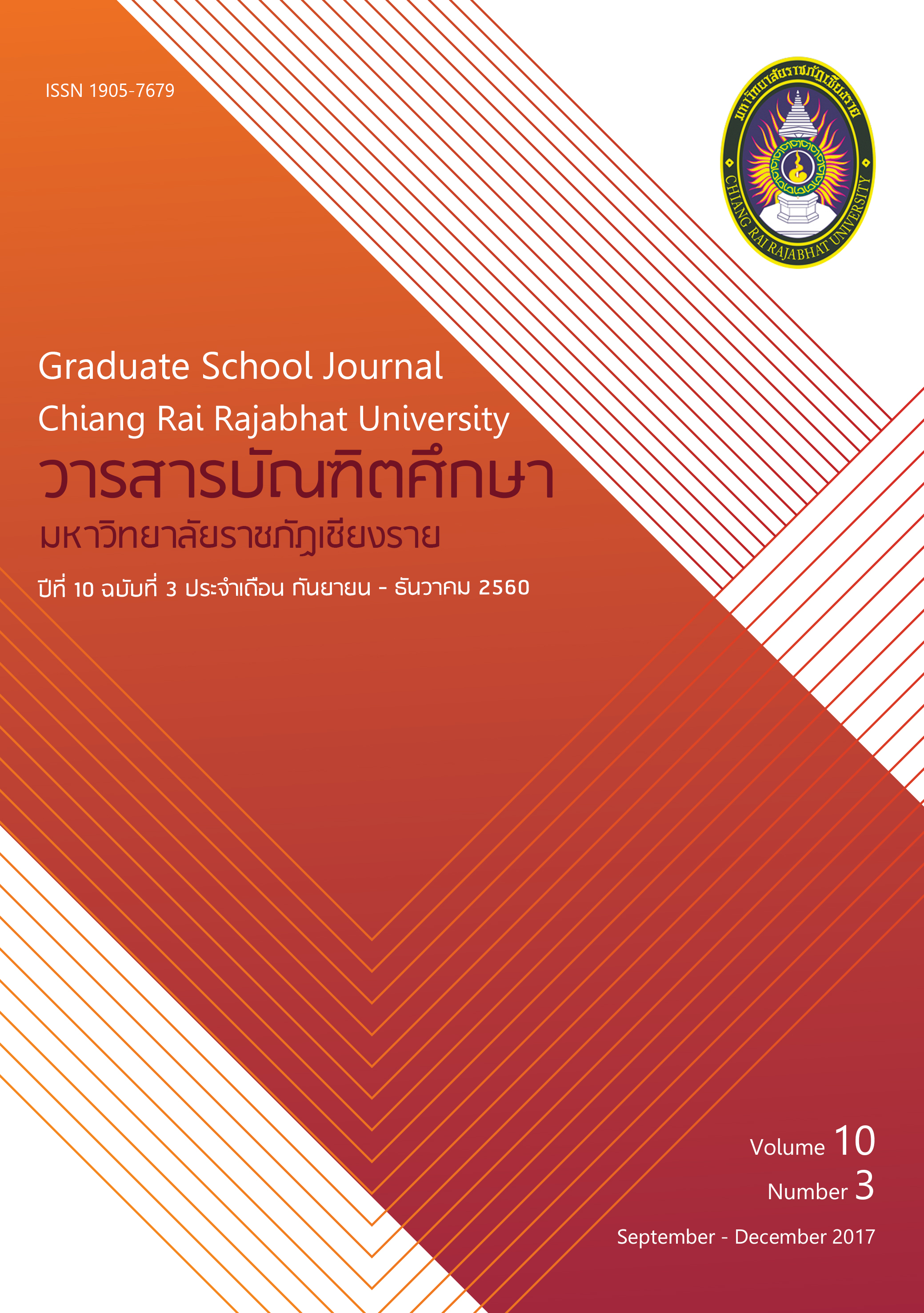การประเมินโครงการบริหารจัดการขยะมูลฝอยบ้านวังหม้อ เทศบาลตำบลร้องกวาง อำเภอร้องกวาง จังหวัดแพร่
Main Article Content
บทคัดย่อ
การศึกษาเรื่อง การประเมินโครงการบริหารจัดการขยะมูลฝอยบ้านวังหม้อ มีวัตถุประสงค์เพื่อ
ประเมินโครงการบริหารจัดการขยะมูลฝอยบ้านวังหม้อ และเพื่อเสนอแนวทางการบริหารงานโครงการบริหาร
จัดการขยะมูลฝอย บ้านวังหม้อ เทศบาลตำบลร้องกวาง อำเภอร้องกวาง จังหวัดแพร่ เป็นการศึกษาเชิง
คุณภาพ (Qualitative Methodology) โดยใช้รูปแบบการประเมินแบบ CIPP จากกลุ่มตัวอย่าง คือ ผู้บริหาร
เทศบาลร้องกวาง ผู้แทนชุมชน และหน่วยงานที่เกี่ยวข้อง จำนวน 15 คน มีการเก็บรวบรวมข้อมูล
ด้วยการสัมภาษณ์เชิงลึกและการสนทนากลุ่ม จากนั้นนำข้อมูลมาทำการวิเคราะห์เนื้อหาและสังเคราะห์ความเรียง
จากแบบสัมภาษณ์เพื่อเป็นแนวทางการบริหารงานโครงการบริหารจัดการขยะมูลฝอย บ้านวังหม้อ ผลการศึกษา
สรุปได้ดังนี้
ด้านสภาวะแวดล้อม ผลการศึกษาพบว่า การดำเนินโครงการบริหารจัดการขยะมูลฝอยบ้านวังหม้อ
มีความสอดคล้องกับความต้องการของประชาชนซึ่งผ่านการประชุมประชาคม เป็นโครงการที่ประชาชน
นำไปปรับใช้ในชีวิตประจำวันได้ และสอดคล้องกับนโยบายของผู้บริหารด้านการจัดการขยะมูลฝอย ด้านปัจจัย
นำเข้า พบว่า เจ้าหน้าที่มีความรู้ในด้านการส่งเสริมการจัดการขยะมูลฝอยโดยศึกษาหาความรู้จากการอบรม
และการศึกษาดูงาน ด้านข้อมูลเอกสารประกอบการอบรมมีความเพียงพอและสถานที่ในการดำเนินกิจกรรม
ของโครงการมีความเหมาะสม ด้านกระบวนการ พบว่า ประชาชนได้รับความรู้เกี่ยวกับประโยชน์ของ
การจัดการขยะมูลฝอยจากการอบรมและจากการประชาสัมพันธ์ ตลอดถึงการได้ความรู้เรื่องโทษที่เกิดจาก
ปัญหาขยะมูลฝอย และพบว่า การดำเนินงานของโครงการมีแผนการดำเนินงานและการแบ่งโครงสร้าง
การดำเนินงานที่ชัดเจน มีการประสานงานผ่านประธานชุมชนและประธานอาสาสมัครสาธารณสุขประจำหมู่บ้าน
(อสม.) โดยมีช่องทางในการประชาสัมพันธ์คือ ป้ายประชาสัมพันธ์ รถประชาสัมพันธ์ และเสียงตามสายในชุมชน
ด้านผลผลิต พบว่า ผลของการดำเนินโครงการทำให้ปัญหาขยะมูลฝอยลดลง ประชาชนมีการนำขยะรีไซเคิล
ไปจำหน่าย และมีส่วนร่วมในการเสนอปัญหาและความต้องการเพื่อแก้ไขปัญหาขยะมูลฝอย ประชาชนมีการนำ
ขยะที่คัดแยกไปทำปุ๋ยหมักจากขยะอินทรีย์เพื่อจำหน่าย และพบว่า การดำเนินโครงการเป็นไปตามแผน
การดำเนินงาน ประชาชนเข้ามามีส่วนร่วมในการแสดงความคิดเห็นตั้งแต่เริ่มดำเนินโครงการและมีส่วนร่วม
ในการดำเนินกิจกรรมของโครงการแต่ยังมีส่วนร่วมในการประเมินผลโครงการน้อย ส่วนด้านการลดปริมาณ ขยะมูลฝอย พบว่า การดำเนินโครงการทำให้ปริมาณขยะมูลฝอยลดลง ขณะเดียวกันกลับพบว่า จำนวน
บุคลากรในการปฏิบัติงานไม่เพียงพอ ดังนั้น ควรประสานภายในหน่วยงานคือ ให้กองต่างๆ ของเทศบาล
เข้ามาร่วมในการดำเนินโครงการอย่างชัดเจนที่มิใช่เป็นเพียงการขอความร่วมมือและควรมีการจัดตั้ง
คณะทำงานโดยมีทั้งส่วนของเจ้าหน้าที่เทศบาลและประชาชนเข้ามาเป็นคณะทำงานร่วมกัน
Article Details
บทความที่ได้รับการตีพิมพ์เป็นลิขสิทธิ์ของวารสารมหาวิทยาลัยราชภัฎเชียงราย
ข้อความที่ปรากฏในบทความแต่ละเรื่องในวารสารวิชาการเล่มนี้เป็นความคิดเห็นส่วนตัวของผู้เขียนแต่ละท่านไม่เกี่ยวข้องกับมหาวิทยาลัยราชภัฎเชียงราย และคณาจารย์ท่านอื่นๆในมหาวิทยาลัยฯ แต่อย่างใด ความรับผิดชอบองค์ประกอบทั้งหมดของบทความแต่ละเรื่องเป็นของผู้เขียนแต่ละท่าน หากมีความผิดพลาดใดๆ ผู้เขียนแต่ละท่านจะรับผิดชอบบทความของตนเองแต่ผู้เดียว
เอกสารอ้างอิง
คนึงนิจ โยธา. (2555). การจัดการขยะของประชาชนในเขตเทศบาลตำบลบ้านเหล่า อำเภอแม่ใจ
จังหวัดพะเยา. (การศึกษาค้นคว้าด้วยตนเองรัฐประศาสนศาสตรมหาบัณฑิต). มหาวิทยาลัย
พะเยา. พะเยา.
ดิศักดิ์ มะโนผาบ. (2548). การประเมินโครงการการจัดการขยะมูลฝอยในเขตเทศบาลเมืองลำพูน.
(วิทยานิพนธ์ศิลปศาสตรมหาบัณฑิต). มหาวิทยาลัยเชียงใหม่. เชียงใหม่.
พิสิฐ ชัยวงศ์สุรฤทธิ์. (2553). การประเมินผลโครงการบริหารจัดการขยะมูลฝอยขององค์การบริหาร
ส่วนตำบลห้างฉัตร อำเภอห้างฉัตร จังหวัดลำปาง. (การศึกษาอิสระรัฐประศาสนศาสตร
มหาบัณฑิต). มหาวิทยาลัยขอนแก่น. ขอนแก่น.
ศุภชัย ไชยลังกา. (2545). การศึกษาเพื่อจัดทำแผนปฏิบัติการจัดการขยะมูลฝอยในเขตเทศบาลตำบล
แม่สาย อำเภอแม่สาย จังหวัดเชียงราย. (วิทยานิพนธ์ศิลปศาสตรมหาบัณฑิต).
มหาวิทยาลัยเชียงใหม่. เชียงใหม่.
สุปรีดา ลิ่วเฉลิมวงศ์. (2540). การประชาสัมพันธ์ของรัฐและธุรกิจ. กรุงเทพฯ: ศูนย์ส่งเสริมวิชาการ.
อรุณี เวียงแสงและคนอื่นๆ.(2548). การติดตามและประเมินผลแบบมีส่วนร่วม.(พิมพ์ครั้งที่2).กรุงเทพฯ:
พิสิษฐ์ไทยออฟเซต.
อุทัย ดุลยเกษม และ อรศรี งามวิทยาพงศ์. (2540). ชุมชนเข้มแข็ง: หนทางสู่การพัฒนาที่ยั่งยืน.
วารสารเศรษฐกิจและสังคม 2547, 3(กรกฎาคม-กันยายน), 35.


